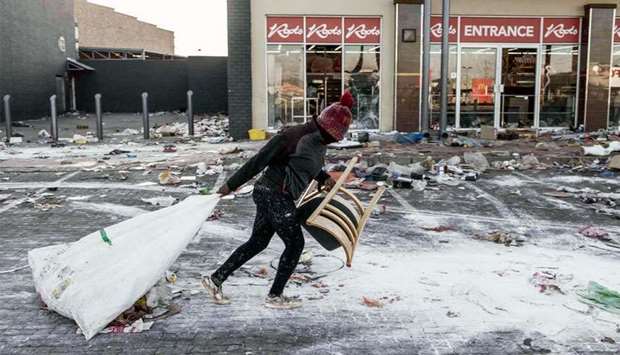Unrest raged in South Africa yesterday for the sixth day running, stoking fears of food and fuel shortages as disruption to farming, manufacturing and oil refining began to bite.
Seventy-two people have died and more than 1,200 people have been arrested, according to official figures, since former president Jacob Zuma began a 15-month jail term, sparking protests that swiftly turned violent.
Looting has hit supply chains and transport links especially in the southeastern province of KwaZulu-Natal, sending a shockwave to goods and services around parts of the country.
The government said 208 incidents of looting and vandalism were recorded yesterday, as the number of troops deployed doubled to 5,000. The country’s consumer goods regulatory body said more than 800 retail shops had been looted.
President Cyril Ramaphosa met leaders of political parties and cautioned that parts of the country “may soon be running short of basic provisions following the extensive disruption of food, fuel and medicine supply chains.”
State-owned logistics operator Transnet declared a “force majeure” yesterday – an emergency beyond its control – on a key rail line that links Johannesburg to the coast because of the unrest.
In the port city of Durban, hundreds of people queued outside food stores hours before they opened, as lines of cars also formed outside fuel stations.
The night before, the country’s largest refinery SAPREF shuttered its plant in Durban, responsible for a third of South Africa’s fuel supply.
Some fuel retailers have begun rationing while others are starting to run dry.
“It’s inevitable that we will have fuel shortages in the next couple of days or weeks,” the Automobile Association’s Layton Beard said.
In Johannesburg’s Soweto township, bread was being sold from a delivery truck outside a major shopping mall as stores have either been looted or shut due to fears of vandalism.
“With these lootings, it’s an inflection point...this has now seriously compromised our energy security and food security,” said Bonang Mohale, a professor of business and economics at the University of the Free State.
The violence has also disrupted the coronavirus vaccine rollout and medicines deliveries to hospitals, said Mohale, echoing similar reports from hospitals.
The country, which has recorded more than 2.2mn infections, is in the midst of a brutal virus third wave, with daily fatalities reaching 633 yesterday.
Christo van der Rheede, executive director of the largest farmers’ organisation, AgriSA, said producers were struggling to get their crops to market because of the logistical “shambles”.
He warned that if law and order were not restored soon, “we are going to have a massive humanitarian crisis.”
Sugarcane fields were torched in KwaZulu-Natal, the main cane-growing region, while elsewhere cattle were stolen.
President Cyril Ramaphosa deployed 2,500 troops at the start of the week to help the overwhelmed police force and the number had grown to 5,000 yesterday.
But the boots on the ground are a small presence compared to the 70,000 troops sent to enforce last year’s coronavirus lockdown.

A suspected looter hauls away items on Wednesday from a ransacked shopping mall in Vosloorus on the outskirts of Johannesburg. (AFP)
